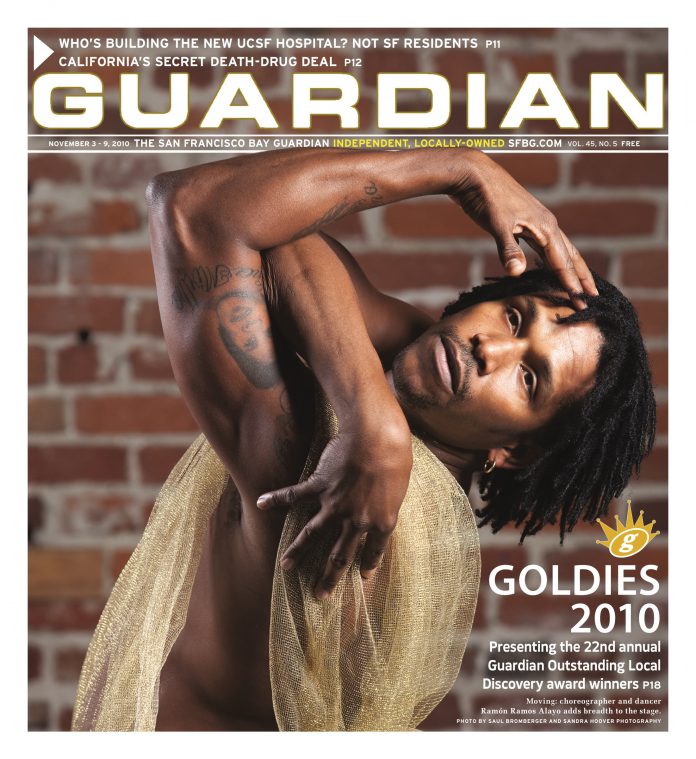One of the joys of house music in this century is that it doesn’t exist. Or rather, its influence is so ubiquitous, its borders so gleamingly porous, that to call a dance track (or indie song, or laptop experiment, or even symphonic composition) “house” is to engage in the laughably vague. And while the expansion of the genre has produced its fair share of unlistenable clutter, it’s also given rise to exciting new standards of quality and adventurousness. Many of the new house standard bearers are located in the Bay Area, and among the most invigorating is Said Adelekan, known as DJ Said.
A Nigerian native who discovered his love for music through his family’s record collection, Said became a young disciple of Fela Kuti, the outspoken legend who shared his political message through Afrobeat, which combined a plethora of African styles into popping, hypnotic grooves featuring chiming guitars and swelling brass and organ chords. After promoting one of Kuti’s clubs in Lagos, Said moved to England to study and absorb the underground London club scene. Soon after, he found himself drawn to “the beautiful and very open” Bay Area in the 1990s, hosting parties like the wonderful, storied Atmosfere, which combined soulful house grooves with live instrumentation and Afrobeat spirit.
As his party reputation grew, Said felt the need to expand and launched the topnotch Fatsouls record label in 2007. “After a decade of successful event production, I realized that throwing parties isn’t all there is, and that creating music is equally important,” he says. “Dance music at the time had gotten so dark and aggressive, I wanted to counter that with something organic, refreshing. Something that celebrated the soul — the soul of the Bay Area, the soul of Africa, the soul of dance music — to bring that to the world.”
With his parties, Said had already attracted global attention to the Bay’s burgeoning Afrohouse scene, and his Fatsouls releases — featuring sparkling live instrumentation, heavy bass-driven grooves, and collaborations with soulful house giants like Alton Miller, Jerome Sydenham, Hideo Kobayashi, and Mr. Raoul K. — repped the Bay abroad as well. (The world dance music community also has been rediscovering house music’s black and African roots, celebrating complex rhythms and Chicago-style funkiness.) “The vast majority of people that download and buy Fatsouls vinyl are from Europe, Japan, South Africa, and Canada.” Said says. “I wanted to create and bring music to the very same people that had been attending my parties and keeping the spirit alive.”
Fatsouls’ first release, “Bad Belle (Remix),” a sublime, slow-burning slice of Afrohouse by Said overlaid with a ethno-ecological spoken word lament by Nigerian poet Ikwunga, was one of the best dance music releases of the past decade, and the seven Fatsouls releases since have shown an astonishing devotion to quality production and expanding scope. (Said plans to release a Fatsouls compilation soon.)
Said hasn’t stopped throwing parties either. “We & the Music” (first Fridays of the month, 9 p.m., $10. 222 Hyde, SF. www.222hyde.com ) is a fantastic and necessary monthly get-down in San Francisco that showcases the deep and lovely grooves being produced here — especially those coming from Oakland’s thriving soulful and Afro-influenced house scenes. East Bay players like Stephen Ringmaiden, Aybee and the Deepblak crew, and parties like The People, Top Ten Social, and Ra Rah are also contributing to the Bay’s liveliness, and Said is an invaluable supporter of their efforts.
“With the everchanging demographic of new partygoers here and so many promoters willing to cash in on faceless trends, I feel there’s a danger of the true San Francisco nightlife essence — diverse in its range but consistent in its dedication to soulfulness and intimacy — being compromised,” Said says. “With my parties and releases, I strongly wish to preserve that here and transmit it to the world.”

